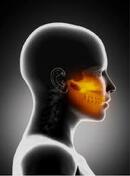The Jaw and TMDs
Let’s break this down. The Temporomandibular joint (TMJ) is the junction between your skull bone (temporal bone) and your jaw bone (mandible). There are several muscles that control the opening, closing, forward, backward, and sideways motions of this joint. There is also a disc inside this joint that acts as a shock absorber. This disc is very important in preventing degenerative joint disease. Sometimes, this disc can become displaced and cause popping or clicking sounds when we open or close our mouth. TMD’s are more prevalent in females than males and usually peaks between ages 20 to 40. It is said to affect 10-15% of the population, but only 5-7% of those actually seek medical attention. Symptoms include: jaw pain, difficulty opening the mouth, ringing in the ears, headache, earache, popping/locking/clicking of the jaw, neck pain, and facial pain. *Keep in mind that in isolation, many of these symptoms can be other medical emergencies. For example, jaw pain is a red flag for a heart attack it is also accompanied by symptoms like chest pain, shortness of breath, dizziness, left arm pain, or nausea. Why do I have jaw pain? Posture A big reason for TMDs is poor posture. Let’s go through a quick exercise. Assume the worst posture you could ever have: round your shoulders, jut your chin forward and up, and let your trunk slump. Notice where your jaw is sitting. You might find that the bottom row of your teeth is drawn backward towards your ears and the front of your neck is long and stretched out. Now assume the best posture you could ever have: roll your shoulders back, tuck your chin in, and sit up nice and straight. You might now find that the bottom row of teeth is more in line with the upper row. Now imagine that you spend most of your time in bad posture… it makes sense that you might start to chronically stress the ligaments, muscles, and the joint in ways that they weren’t meant to be! Stress Another large reason for TMDs is stress. Stress can cause an array of body habits. One of them is clenching the jaw, which creates tension and constant compression at the TMJ. With this comes muscle spasm, which can then send pain upward, giving you a splitting headache. Overuse & Poor Habits The TMJ is the most used joint in the body. We need it to talk, eat, cough, make facial expressions, sing, and more. Sometimes constant use of the jaw joint, like when you chronically chew gum, can lead to degeneration in the joint. When this happens, you can cause damage to the disc in between the joint space which can lead to painful popping and clicking. Smoking, consistently eating hard foods, and cheek biting are all also linked to TMDs. Hormones Part of the reason TMDs are more prevalent in the female population, especially during their reproductive years, is due to the hormones estrogen, progesterone, and relaxin. Although there is no definitive link, studies suggest a correlation between increased female hormones and increased TMDs. Trauma Trauma to the TMJ can cause residual chronic pain in this area. For example, blunt trauma from a punch or car accident, a long dental procedure, and oral intubation can all compromise the structures in and around the jaw. Co-morbidities TMDs are often linked to chronic conditions like Rheumatoid Arthritis, Ehlers-Danlos Syndrome, and other diseases. If you know that you have arthritis or another systemic disease that affects multiple joints in your body, your jaw pain might be triggered from this as well. What to do. To help alleviate symptoms, there are many lifestyle changes to take into consideration.
Last Thoughts Severe forms of TMDs can be quite debilitation. Imagine you can’t even open your mouth or chew down to eat your favorite chocolate chip cookie! Don’t wait forever to get checked for your jaw pain. When you allow the pain to go from an acute state to a chronic state, it takes much longer to recover and feel normal again. Don’t be afraid to use a mouth guard at night to prevent chewing. It takes a while to get used to, but it may help tremendously. Any step you take in the list of 5 above will get you one step closer to less jaw pain… and eating your favorite cookie again! References:
Comments are closed.
|
Dr. GaziWelcome! Learn something of value, solve some of your problems, and feel a whole lot better with Sneha Physical Therapy's blog! Categories |
|
Sneha Physical Therapy
Copyright 2022 . All Rights Reserved .
Copyright 2022 . All Rights Reserved .


 RSS Feed
RSS Feed